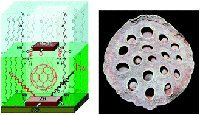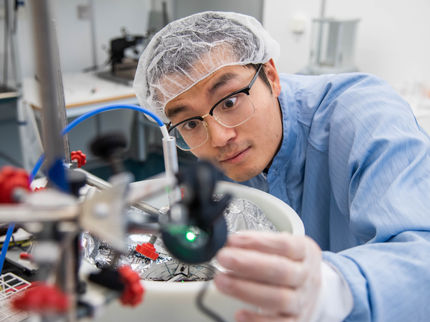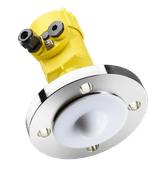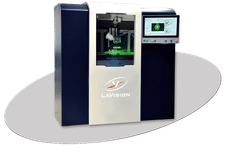Fullerenes well trapped
Advertisement
Scientists in Australia and India have shown that a zinc porphyrin-based yoctowell can be used as a fullerene receptor.

Sheshanath Bhosale and colleagues from Monash University and a co-worker from North Maharashtra University, have designed a yoctowell cavity (a nanoporous surface modified with silica particles) that is capable of trapping fullerenes.
The formation of a stable inclusion complex of fullerene is formed via donor-acceptor and hydrophobic interactions within the cavity walls. The fullerene is prevented from leaving the well by an anionic porphyrin molecule that is used to cover the well entrance. ‘Encapsulations of optically active components (such as fullerenes) can be useful for the assembly of electronic nanodevices that will be suitable for quantum information processes. Also the use of porphyrins as the base by which the yoctowell templates itself, allows both electrochemical and photophysical handles that will enable us to study the inclusion phenomena further,’ explains Bhosale.
Interestingly, the fullerene molecule remains inside the cavity even when the solvent system has been changed from chloroform to water. This is an obvious advantage when developing such systems for potential biological applications. Bhosale explains that ‘it is possible that a yoctowell filled with biologically active molecules may be used as vehicles for drug delivery, receptors and sensors in living organisms.’
Original article: Sheshanath V. Bhosale et. al.; "Construction of trimeric porphyrin-fullerene-porphyrin stacks within surface-derived pores of nano-scale dimensions"; Chem. Commun. 2009
Other news from the department science
These products might interest you
Most read news
More news from our other portals
See the theme worlds for related content
Topic world Sensor technology
Sensor technology has revolutionized the chemical industry by providing accurate, timely and reliable data across a wide range of processes. From monitoring critical parameters in production lines to early detection of potential malfunctions or hazards, sensors are the silent sentinels that ensure quality, efficiency and safety.

Topic world Sensor technology
Sensor technology has revolutionized the chemical industry by providing accurate, timely and reliable data across a wide range of processes. From monitoring critical parameters in production lines to early detection of potential malfunctions or hazards, sensors are the silent sentinels that ensure quality, efficiency and safety.




































































